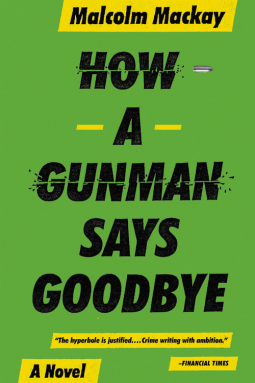
How a Gunman Says Goodbye
by Malcom Mackay
This title was previously available on NetGalley and is now archived.
Send NetGalley books directly to your Kindle or Kindle app
1
To read on a Kindle or Kindle app, please add kindle@netgalley.com as an approved email address to receive files in your Amazon account. Click here for step-by-step instructions.
2
Also find your Kindle email address within your Amazon account, and enter it here.
Pub Date Apr 21 2015 | Archive Date May 11 2017
Description
HOW DOES A GUNMAN RETIRE?
Frank MacLeod was the best at what he does. Thoughtful. Efficient. Ruthless. But with his health failing him, how long before he's no longer of use to his employers?
A new job. A target. But something is about to go horribly wrong. And up-and-coming hitman Calum MacLean will be called upon to pick up the pieces.
Most gunmen say goodbye to the world with a bang. Frank's still here. No longer in his prime, certainly. But with decades of experience at the top of his profession. Underestimating such a man could prove to be deadly.
A Note From the Publisher
Book 2 in the Glasgow Trilogy
Advance Praise
“You know how among all the kids acting tough at school there is one that stands out, the only one who convinces? Malcolm Mackay is that man.”—Crime Time
“If you like Ian Rankin, Stuart MacBride, Val McDermid, Denise Mina—Malcolm Mackay is right up there.”—Peter James, author of Dead Like You
“Mackay is a true original, managing to conjure up a gripping new way of portraying city-noir.”—Michael Berlins, The Times (UK)
Available Editions
| EDITION | Paperback |
| ISBN | 9780316337335 |
| PRICE | $15.00 (USD) |
Average rating from 13 members
Featured Reviews
"It’s the kind of industry where you have to be shockproof. People do things that logic can’t explain.”
In Malcolm Mackay’s crime novel How a Gunman Says Goodbye, the second book in the Glasgow Trilogy, we’re immediately back on familiar territory with a familiar character, hitman Frank MacLeod. In book 1: The Necessary Death of Lewis Winter, Frank MacLeod, the aging hitman for the Peter Jamieson crime organization is temporarily out to pasture with a hip that needs surgery. It’s a bad time for him to be out of commission as small-time drug dealer, Lewis Winter, treading on dangerous ground, starts selling on Jamieson’s turf. Jamieson, and his right hand man, the reptilian John Young, suspect that Winter wouldn’t take this step unless he had some powerful friends, so they conclude that Lewis Winter must be killed as both a statement and damage control. Since Frank MacLeod will soon be sunning himself in Spain for the recuperation period, Jamieson and Young take Frank’s advice and hire freelance hitman Calum MacLean to kill Lewis Winter. According to Frank, Calum is “the best of the new breed,” and while Jamieson and Young consider that Frank is irreplaceable, they understand that they need to step outside of their organization for the hit and also that eventually, Frank will have to be replaced. That day hasn’t come yet…
How a Gunman Says Goodbye finds sixty-two-year-old Frank back in Glasgow with the Jamieson organization, and the turf war continues. This time the trespassers are two young men:
‘There’s a kid named Tommy Scott,’ Jamieson’s saying. ‘Wee bastard of a thing. We didn’t think much of him. He used to be a peddlar. Street stuff. Ran with a gang, sold to them–shit like that. Used to do deliveries on a bicycle. A fucking bike! I guess I underestimated the bastard. I’ve been getting complaints. The kid cutting into out market, up Springburn way. I tried sending a warning, but the little bastard’s tough. Determined, too. Got one of his gangs providing security for his peddlers. Only has three of four guys delivering for him now, but a couple of months ago he had none. He’s growing fast, and stepping on toes. I’m fed up of hearing people complain. I need my people to know I’ll protect their patch. I need Shug-bloody-Francis to know his men aren’t safe.’
Tommy Scott and his childhood mate, the hyped-up, irrational and compulsive, Clueless live together in a tower block, just one floor below the top.
Well, that’s just bloody brilliant. Very few places worse than that. Having to make an exit from a tower block is never ideal. You’re always a long way from your getaway.
Right. And a tower block, which can serve as a veritable fortress for the criminals who live there, is always a hostile environment for those who don’t belong. But Frank is confident and considers this a “soft job.” What can go wrong?
In The Necessary Death of Lewis Winter, the focus is the individual within the criminal organization, and that theme continues in the second book in this gritty trilogy. Whereas relative newcomer, freelancer Calum MacLean was the focus in the first book, old-timer, the legendary Frank MacLeod is the focus of How a Gunman Says Goodbye. Peter Jamieson considers Frank a friend, someone he will always trust, but Calum thinks Frank’s best days are over. For his part, Frank considers Calum, a kid who’s too slow with his contracts, “takes too long in the scouting,” a time waster who doesn’t understand the meaning of deadlines. It’s a crucial time in Jamieson’s crime organization; Jamieson must either be prepared to grow or be cannibalized by the suddenly hungry and aggressive Shug Francis. Jamieson must have a reliable gunman and he’d like to add Calum to the organization, but Calum wants the independence of freelance work.
In The Necessary Death of Lewis Winter, author Malcolm Mackay shows the benefits and the drawbacks of being part of a criminal organization, and again those issues have relevance in this second book in the series. Being part of an organization gives you protection if you ever need assistance, and in theory, you should have more value, but there again, if you’re freelance, you can walk away any time you feel like it. Gunmen Calum and Frank are on opposite ends of their respective careers–Calum is gearing up to be the best hitman in Glasgow while Frank’s career is winding down. Looking at a lonely ‘retirement,’ Frank suddenly realizes that he has no life outside of the organization–no wife, no family, no friends, no hobbies:
You spend decades as a gunman, which few do, and you think of the world from a different angle. It’s all about secrecy and self-preservation. A lifetime of hiding the things you do. It changes you. It must have changed Frank, too. … He’s a gunman, and that’s all he’ll ever be. You spend so long teaching yourself to be that, you simply can’t become any other kind of person. You become so tied to your work it dominates your life. Destroys it.
On the other end of the spectrum is D.I Michael Fisher–a devoted, hardworking copper who’s trying to fit together all of the puzzle pieces of the Shug Francis-Peter Jamieson war. Fisher is a lonely man who’s every bit as isolated as Frank MacLeod:
He has to take action or see this all fall through his fingers. He’s not going to let another chance go. You spend years getting good results, doing your job the right way. You have a couple of failures, and people start to point the finger. They think you don’t have it anymore. He’s been guilty of that himself in he past. He knows how it works. A cop getting older–you start to question their ability to close a case. Are they still in touch with modern crime and policing techniques? Did they still have the hunger? Some do lose it. They’ve done their bit, now they’re looking towards the end. He’s not that kind of cop. His ending will be forced on him, he knows it. The hunger’s still there, but nothing is falling his way.
Mackay builds an argument for the similarities between two parallel organizations: the criminals and the police, and then, of course, there are those snitches and bad cops, spurred on by desperation, cynicism or compromising need, who traverse between both organizations. D.I. Fisher feels the pressure to produce and feels himself near the brink of a career move–one that could make or break him, and both Frank and Calum’s careers are also on the brink of change. Mackay doesn’t belabor the comparisons between hit men Frank and Calum, one on the way up and one on the way down, but the connections are there, and in this novel both men face tough personal and professional choices. Told in a terse, unemotional style, again the emphasis is on the individual within the criminal organization with issues such as loyalty, friendship, and trust challenging the vital security of the Jamieson empire. While we see the ‘human’ side of our protagonists, Calum and Frank, Malcolm Mackay never allows sentimentality to intrude on the narrative.
Those who’ve read the first novel in the trilogy will not be disappointed by the second book in the series. Tense, dark and with a merciless gritty reality, Calum’s story continues. …
Review copy
 James K, Librarian
James K, Librarian
Frank MacLeod was one of the best gunmen in the business, but now he’s older and his first job after hip surgery goes very wrong. The second book of the Glasgow Underworld Trilogy is even more poignant and compelling than the first as the characters grow and wrestle with the hard choices they make.







